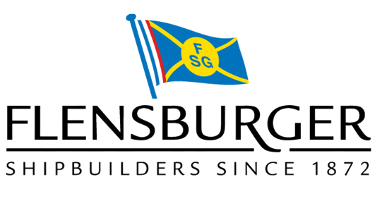Flensburg: Flensburger-Schiffbau-Gesellschaft (FSG) has chalked up yet another global sales success by signing a contract with the Australian shipping company SeaRoad for a 181 metres long RoRo ferry ship new building. What is special about this ship however is that it will be the first of its kind for FSG to be powered by extremely eco-friendly LNG – liquefied natural gas – rather than by Diesel or heavy oil. FSG and SeaRoad have been working intensively over the past years on this project which can now successfully move on into a new phase with the signing of this contract.
For FSG Managing Director Peter Sierk this is very much more than just another contract. “On the one hand, our shipyard is to deliver a ship to Australia for the first time ever. On the other hand , this new building demonstrates yet again the high-level competence of our yard and our innovative capabilities”, he says. “We are very proud that SeaRoad has chosen us and that our ideas have prevailed over those of international competitors. We look forward to continuing the good and intensive co-operation we already enjoy with SeaRoad and which has been characterised over the the time by great trust, professionalism and by our mutual focus on f inding innovative solutions”, Sierk adds.
The world’s first RoRo ferry of this size with liquefied natural gas propulsion is designed to provide future regular liner service between Melbourne on the Australian mainland and Devonport on the island of Tasmania. She will boast a particularly flexible cargo carrying capability and be in a position to transport containers, including reefer units, trailers, cars and hazardous cargo as well as live animals – for example cattle. She will be the first RoRo ferry in the world able to transport reefer containers and hazardous cargo side by side. This will be made possible by a special concept developed by FSG. Commented Peter Sierk: “This liner shipping service will be of existential importance in supplying Tasmania with its basic essentials. That is why SeaRoad decided to commission a shipyard which can deliver quality, high-value vessels which guarantee trouble-free, reliable liner shipping.
Liquefied natural gas propulsion makes the new ferry a ‘green ship’. “LNG operation is currently the cleanest fuel combustion process in existence”, says Sierk. “The emission of sulphur oxides (SO2) and dust is almost nil while that of nitrous oxides (Nox) is also reduced by nearly 100% and that of carbon dioxide (CO2) by about 20%”, he adds. The liquefied natural gas is taken on board the ship in mobile tanks during regular ship loading and unloading. Once on board, the tanks are secured and become f ixed ship fuel tanks without the need for any transshipment thanks to a special locking system also developed by FSG. The newbuilding will be 181 metres long, 26.6 metres wide and have more than 1960 lane metres available. Her speed will be 20.5 knots.It is planned to start construction at FSG on Flensburg’s Batteriestrasse in September 2015 and to deliver the ship in the third quarter of 2016.

